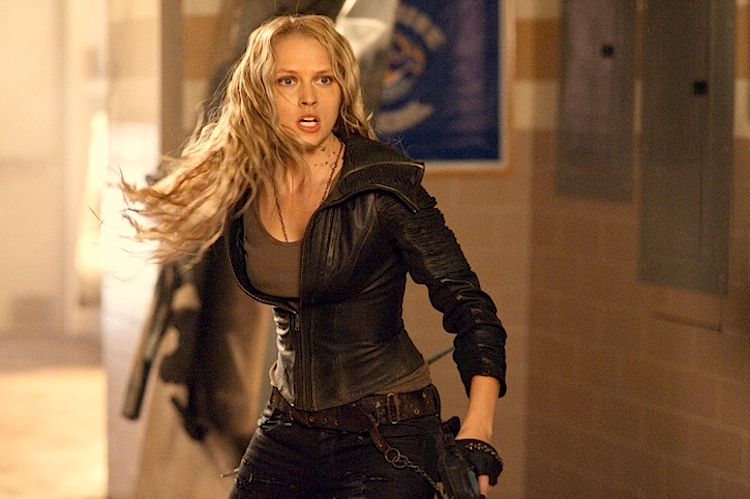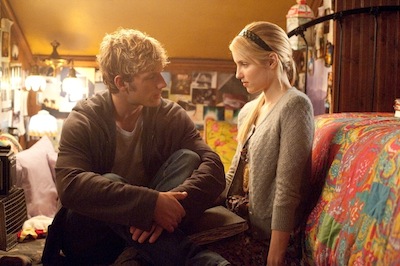
By Jason Apuzzo. THE PITCH: Sexy alien teenagers flee to planet Earth on the run from another alien race out to exterminate them. One such teenager, played by Brit star Alex Pettyfer, hides out in a small Ohio town (‘Paradise’) where he falls for a cute blonde at his high school – played, conveniently enough, by Glee‘s Dianna Agron – and otherwise learns to love Heartland America, pickup trucks, pet puppies and middle class life.
THE SKINNY: This very solid, D.J. Caruso/Michael Bay adaptation of the popular young adult novel, I Am Number Four, works effectively because of its excellent casting and detailed attention to the emotional lives of its young characters. The film also works as an affectionate encomium to the values and lifestyle of middle America, right at a time when those things seem most under assault. Frankly, I never thought Ohio could look like such a great place to live – especially post-LeBron.

WHAT WORKS: • The cast, top to bottom. Alex Pettyfer as the teen alien ‘John Smith,’ and Dianna Agron as his girlfriend Sarah steal the show. Pettyfer comes across as a brooding hunk, and Agron has an ironic, quirky quality to her that makes her appealing. The two have definite chemistry – and, not surprisingly, they’ve apparently been dating off-screen since making this film.
• The depiction of ‘Paradise,’ Ohio as, well, a ‘paradise’ of warm suburban families, football games, Halloween carnivals … I’m ready to move right in. Hollywood so rarely tries to make the Heartland look appealing; here they actually make it look lyrical and inviting.
• Aussie Teresa Palmer nearly steals the show in the third act when she swoops in from Planet Michael Bay on her Ducati motorcycle and starts laying waste to the alien bad guys. Even though she looks to be about 85 pounds – and has a thin, raspy voice – she’s perfectly convincing as an ass-kicker due to the vaguely insane look in her eye (á la Jolie). Also: Aussie accents are sexy, especially when burnished by cigarette smoke.
• The alien creatures were excellent, and suitably menacing. Nice wok, as always, by ILM.
WHAT DOESN’T WORK: • The appearance of the alien bad guys. Essentially they’re 7-foot tall white guys with tattoos, pig-like faces, wearing dark trenchcoats. For some reason they reminded me of ‘Birdman’ Chris Andersen of the Denver Nuggets. It was, however, admittedly rather creepy when they walked into the high school with assault rifles near the end of the film – because they looked like the Columbine killers.
• The general sense that you’ve seen films like this a thousand times; especially films featuring white teenage guys with ‘special powers,’ who need to learn to use them responsibly, etc. Just for variety’s sake, I’d love to see someone make a movie about, say, a chubby Hispanic gal with ‘special powers’ who needs to use them responsibly.
THE BOTTOM LINE: Initially I didn’t want to see I Am Number Four because I assumed it was going to be about Brett Favre. OK, bad joke … actually, what I’d initially thought was that with its vaguely MTV-overtones I Am Number Four was going to be the runt of the ‘alien invasion’ litter, in terms of this new wave of films hitting theaters right now.
As it turns out, the film was much better than I’d expected – far livelier and more sincere than its advertising would tend to indicate – and, in fact, I’m now wondering whether it may end up being one of the better films of the genre. The reason I say this is because the people behind I Am Number Four have obviously figured out the big ‘secret’ behind the alien invasion genre: which is that it isn’t really about ‘aliens’ at all, but about us. To put it philosophically, one might say that these are films about the psychology of the Other, especially when we ourselves feel like an ‘Other’ in environments that confine or restrict us.

And on this point, I Am Number Four seems to borrow a great deal from an underrated film of the genre from 1959, called Teenagers from Outer Space – a film that’s a lot better than it’s campy title would imply. That plucky little film was also about a teenager who arrives from outer space, falls in love, wants to settle down in a small town – but has to fight off his own alien kind in order to stay there. (The film is also famous in cult circles for “the gargon herd” – a species of alien creature that look suspiciously like live lobsters.)
Much like that film, I Am Number Four effectively channels the anxieties associated with teenage life, particularly in depicting how group pressure can make even ‘normal’ kids feel like outsiders. I’m trying not to use the term ‘alienation’ here, but that’s obviously what we’re talking about; it’s a phenomenon that’s almost a rite of passage for teenagers, assuming they have anything akin to an interior life. I Am Number Four mines those youthful feelings of social apprehension for all they’re worth, while at the same time not letting teenagers off the hook: at some point, the outside world and its grown-up problems will always come crashing down on kids, whether they’re prepared for it or not – and, without giving anything away, that’s certainly what happens in this film.

Incidentally, it’s been a long time since I’ve been in high school – or maybe it just feels that way – but I was glad to see in I Am Number Four that things apparently haven’t changed very much since my time. The only differences seem to be that guys are wearing a lot of hooded sweatshirts these days, and everybody’s phones are constantly ringing with texts and voice mail. I would just turn the damn things off. But chicks are still into photography, and prefer guys approaching them (i.e., not the other way around); football players still basically rule the show, and science nerds are still plotting their later-in-life revenge on the rest of us. So everything seems pretty normal, here.
What I’m so pleased to report is that the central theme of I Am Number Four is the exact opposite of Avatar’s, in so far as it’s the alien here who wants to become human – to experience the pleasures and pains of normal human life, to live a regular middle class existence in a small town, with a girlfriend and a caring family; in other words, not to become a radicalized warrior fighting The Man and/or the imperialist military-industrial complex.
You don’t always see this sort of classic, Capra-esque American aspiration appear in big-time Hollywood filmmaking right now – the aspiration to live the American Dream, without abandoning small town, middle class life – and so it’s nice to see it return. Frankly, the future of the country may depend precisely on such aspirations.
It also leads me to think that LeBron was crazy to leave Ohio – especially if it looks as good as it does in this film.
Posted on February 19th, 2011 at 3:30pm.
I’m usually pretty hard on writers — it’s part of my job. So, I have to give credit where I see it.
Jason, you’ve discovered a unique presentation that’s suitable for the Web, but also allows for in-depth analysis. Other writers pontificate in blobs of copy that lose you after two graphs, but you’ve broken it up in a way that’s both reader friendly and sticks to your strengths as a writer.
You’re comments on middle-American life, and comparison to Avatar are particularly astute. It’s one tiny example of what separates this site from others.
As for the film, I may just have to get to the theater to see this. It’s rare for a film like this to achieve a level of sincerity, but I think that comes from the writer being able to dig a little deeper to avoid cliches.
How was Timothy Olyphant in this? I can’t think of a modern actor that plays the reluctant hero better than this guy.
Vince, that’s exceptionally kind of you. I really appreciate your attention to the details that we obsess over here on this site.
Certain films seem to demand full reviews, others I prefer to treat a bit more casually. I Am Number Four is basically a genre film, so I didn’t feel that I could give it a full, in-depth analysis … yet at the same time, I sometimes feel more free to say certain things in this more ‘casual’ format than I might in a full, formal review. Writing on the web is sometimes best, I think, when it comes across as a conversation between writer and reader – a chat among like-minded friends. I like people to feel that’s what’s happening here at Libertas, so thank you.
As for Timothy Olyphant, he didn’t do much for me. He was fine, but the kids were really the center of the show here. I noted just this morning, sadly, that apparently the two leads in this film have broken up – at least for the moment. Hormones being what they are, they’ll probably be back together in a few weeks …
Generally I avoid anything that has the label “teen” on it, but you’ve written such a persuasive review I might just go and check this out. It’s hard, because I rarely have a good time at the movies anymore. You know, you’re always waiting for that kick in the teeth that makes you angry you wasted your money on the ticket. If this avoids that, and actually seems to appreciate our country, that’s definitely a good thing.